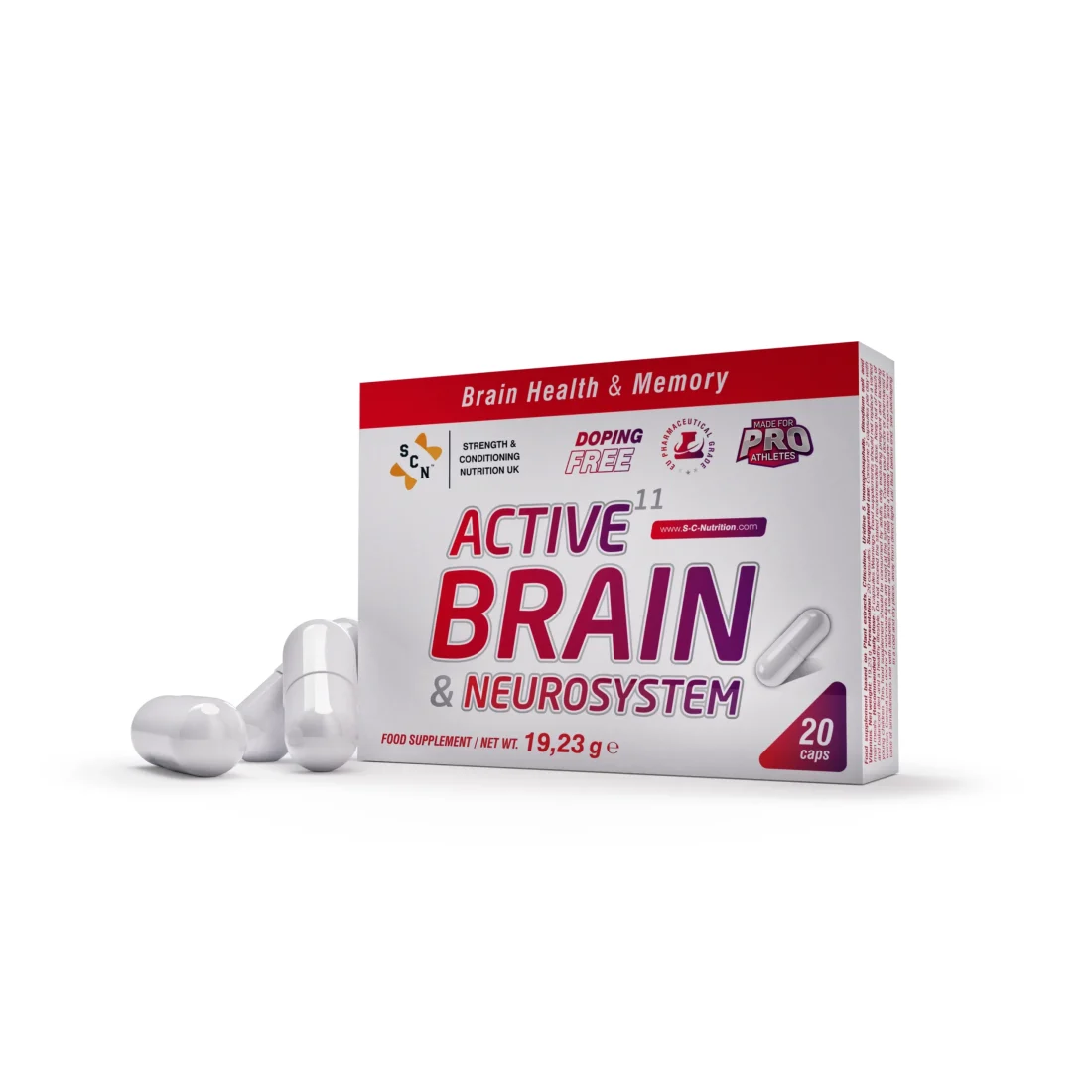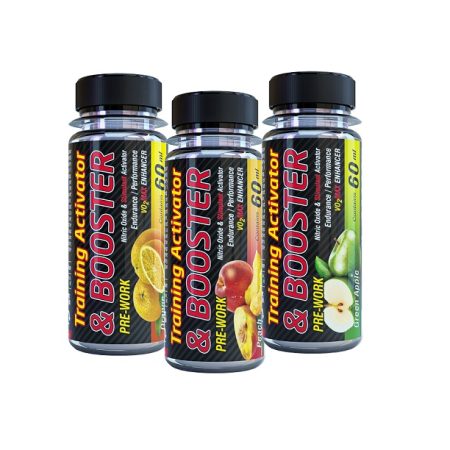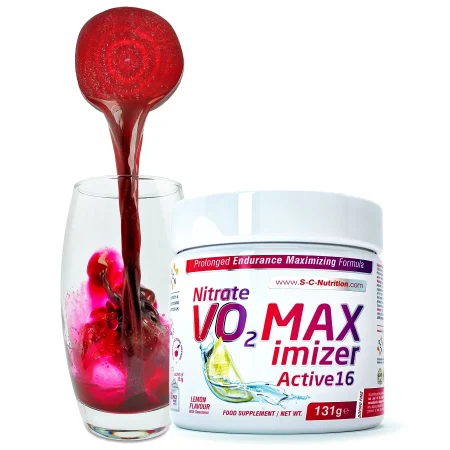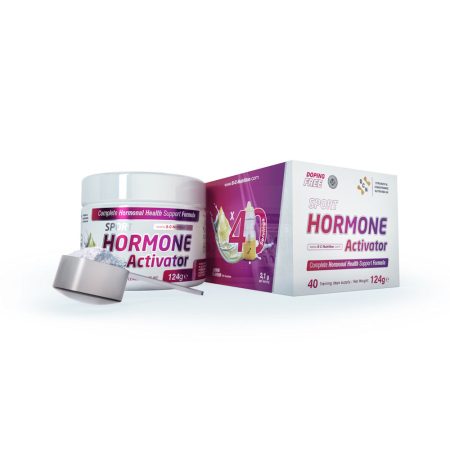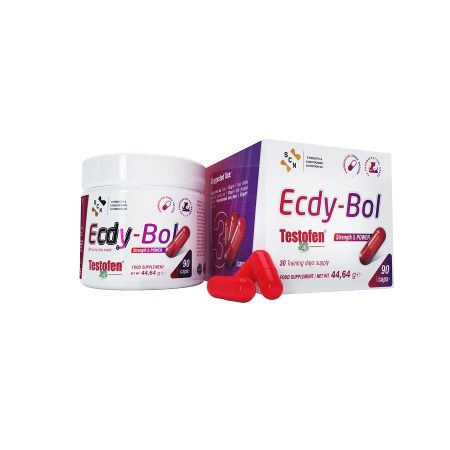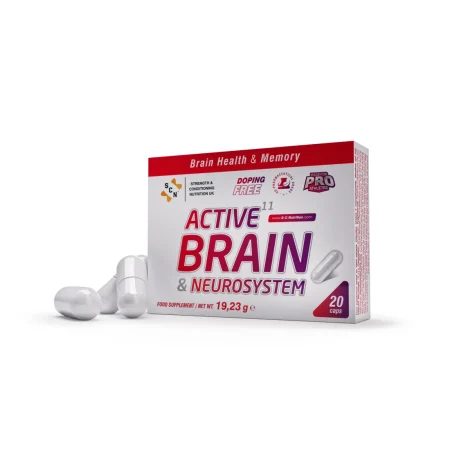説明
アクティブ11 脳と神経系
脳機能、集中力、明晰さ、学習速度、運動学習速度を超高度化するために研究開発された、究極かつ最も完全なフォーミュラ。
- より速く考える
- より良く考える
- より良い焦点
- 最適な透明度
- 神経損傷の早期回復
- 認知能力の向上
- アルツハイマー病とパーキンソン病の研究に裏付けられた
- 記憶喪失に関する研究に裏打ちされた
- 気分と憂鬱の改善に関する研究に賛同
- より良い神経系 - CNSの協力
- より速い学習
- フォーカス強化
- 強化された精神的注意力
- 脳の可塑性の向上 - 神経新生とシナプス形成
- 気分とやる気の向上
...その他多くのメリット
アクティブ11 脳と神経系
の必需品である:
- バランス、テクニックの問題、反射的な動きを修正する必要があるすべてのアスリート
- 事故後)神経にダメージを受けているすべての人
- 即効性があり、明晰でマルチタスク処理能力の高い頭脳を必要とするすべての人
- 速習を必要とするすべての人(試験期間中や厳しい学習期間中の学生)
- 脳がぼんやりしたり、ぼやけたり、思考が鈍くなったりしている人、特に50歳以上の成人の方。
- ADHDや先延ばし癖のある方で、集中力や仕事への意欲が必要な方。
- アイデアを見つけたい人、タイムライン・プロジェクトに取り組むすべての人
なぜ アクティブ11 脳と神経系?
脳サプリメントを11箱丸ごと1箱で摂取するのだから!
アクティブ11 ブレイン&ニューロシステムは、最大限の生物学的利用能と効能を持つ成分および医薬品品質のハーブエキスのみを配合した、11成分からなる最大用量のユニークな処方です。
この配合は、各成分のあらゆる利点と、このユニークな相乗効果製品の大きな効果を即座に実感できるだろう。
脳を活性化させ、記憶力を高め、集中力を高め、神経系を活性化させます。
中身 アクティブ11 脳と神経系
1日の推奨摂取量あたりの栄養素:
| 原材料 | 2カプセル | %NRV* |
| ライオンのたてがみ乾燥エキス
30%多糖類 |
500 mg
150 mg |
|
| リボケア®UMPリボヌクレオチド(ウリジン5'一リン酸二ナトリウム塩) | 260 mg | |
| シチコリン | 250 mg | |
| 田七人参乾燥エキス
80%ジンゲノシド |
160 mg
128 mg |
|
| バコパ・モニエリ乾燥エキス
45%バコサイド |
150 mg
67,5 mg |
|
| イチョウ葉乾燥エキス
24% ギンコフラボグリコール |
120 mg
28,8 mg |
|
| カネカ ユビキノールQH | 60 mg | |
| マリタイム・パイン乾燥エキス
95% プロアントシアニジン |
60 mg
57 mg |
|
| ベリテ™ピュアレスベラトロール | 50 mg | |
| ピロロキノリンキノン二ナトリウム塩 | 20 mg | |
| ビタミンB6 | 4 mg | 285,7% |
| ビタミンB12 | 60 µg | 2400% |
| NADH ニコチンアミドアデニンジヌクレオチド | 5 mg |
*NRV栄養基準値
ライオンのたてがみ乾燥エキス
ライオンのたてがみには、神経成長因子(NGF)を刺激する強力な生物活性化合物が豊富に含まれている。二重盲検試験で、研究者は次のことを発見した。 ライオンのたてがみを補給すると、記憶力と認知機能が向上した。ただし、コンスタントに摂取することが条件だ。
ライオンのたてがみで脳を守る。
ライオンのたてがみは、記憶力、集中力、認知力を刺激する、非精神作用のある機能的な合法キノコです。
ライオンのたてがみは、脳を活性化することからスマートマッシュルームとしても広く知られています。
ヒューマン・プロ・ライオンのたてがみは、市販されているライオンのたてがみエキスの中で世界で最も強力なものです。
- 記憶力と集中力を刺激する
- 神経成長因子(NGF)を刺激する
- 新しい情報を学び、身につけるための自然な能力を刺激する。
- エネルギーレベルを刺激する
- 不安や抑うつを改善する
- 強力な免疫サポート
- すべての有効成分が濃縮され、生物学的に利用しやすくなっています。
1.アルツハイマー病やパーキンソン病のような認知症を予防する可能性がある。
ライオンのたてがみには2つの主要な生物活性化合物がある: ヘリセノン そして エリナシネス.
ヘリセノン 脳がより多くを生産するのを助ける。 神経成長因子(NGF) そして Eリナシネス は、神経新生としても知られる新しいニューロンの生成を助ける(出典)。
ライオンのたてがみは、脳内のNGFの生成を刺激するのに非常に効果的であることが示されている。血液脳関門を通過すると、ライオンのたてがみはNGFの放出を刺激し、神経の損傷を治療・予防することが示されている。
一般的に、脳が年をとると、新しい結合を形成する能力が低下する。したがって、脳内でより多くのNGFが産生されれば、アルツハイマー病やパーキンソン病などの神経変性疾患の症状を緩和できる可能性がある。このことは、アルツハイマー病のような進行性の記憶喪失疾患からマウスを守ることに成功した動物実験ですでに示されている(ソース, ソース, ソース, ソース).
2.不安や抑うつを軽減する可能性がある。
現代社会では、ほぼ30%の人が不安やうつの症状を経験している。 出典).不安やうつ病を引き起こす要因はたくさんあるが、重要な要因のひとつは体内の慢性炎症である。
ライオンのたてがみには強い抗炎症作用があり、不安やうつの症状を軽減させるという研究結果がある。 出典, 出典).
さらに他の研究では、ライオンのたてがみが脳細胞の再生をサポートし、海馬の機能を向上させることが示されている。海馬は、記憶や感情を処理する脳の部位である。海馬の働きが良くなれば、不安やイライラ、うつが緩和されると考えられている。 出典, 出典).
研究はすでに非常に有望視されているが、これらの利点を完全に確認するには、より多くのヒトでの研究が必要であることに注意することが重要である。
3.神経系の損傷からの回復を早める。
研究によると、ライオンのたてがみエキスは、脳(脳卒中)、脊髄、その他の体内の神経の損傷からの回復を早めるのに役立つ可能性がある。これは、体内の神経細胞の成長と修復を刺激することによって行われる。 出典, ソース, 出典)。
ラットを使った研究では、ライオンのたてがみは神経系の損傷からの回復に必要な時間を23~41%短縮することが示されている。 出典).
別の研究では、脳卒中直後のラットに高用量のライオンのたてがみキノコエキスを与えたところ、炎症が減少し、脳卒中に関連した脳損傷が44%縮小した(ソース).
しかし、これらの研究は非常に有望であるため、ヒトに対するこの有益性を確認するためには、より多くのヒトを対象とした研究が必要である。
4.心臓病のリスクを減らす可能性がある。
心臓病の要因としてよく挙げられるのは、肥満、高トリグリセリド、大量の酸化コレステロール、血栓ができやすくなることである。
最近の研究では、ライオンのたてがみエキスがこれらの因子のいくつかを改善し、心臓病のリスクを軽減する可能性があることが示されている。
例えば、ライオンのたてがみは肥満と中性脂肪を低下させることが示されている。ラットとマウスを使ったある研究では、ライオンのたてがみエキスが脂肪代謝を改善し、体内のトリグリセリドレベルを低下させたことが示されている。 (出典)。 別の研究では、1ヵ月後にトリグリセリド値が27%低下し、体重増加が42%減少した 出典).
さらに、ある研究では、ライオンのたてがみエキスは、体内の血流中のコレステロールの酸化レベルを低下させることが判明した。 (ソース).コレステロール分子が酸化すると硬くなるため、心臓病のリスクが高まる。また、ライオンのたてがみにはヘリセノンBが含まれており、血液中の血液凝固速度を低下させ、脳卒中や心臓発作のリスクも低下させる。 出典).
5.糖尿病の症状管理を助ける
糖尿病は、血液中の糖分濃度を適切に調節できなくなる病気です。身体は常に血液中の糖分濃度を調節していますが、常に血糖値が高い状態が続くと、腎臓に問題が生じたり、手足の神経が失われたり、視力が低下したりすることがあります。
ライオンのたてがみには、血糖値を改善し、体内の症状を抑える力があることが示されている(ソース).
複数の動物実験で、ライオンのたてがみが正常マウスと糖尿病マウスの血糖値を下げることが示された。この効果は低用量でも顕著であった。 出典, 出典)。 ライオンのたてがみには、消化管内で炭水化物を分解する特定の酵素(α-グルコシダーゼ)の活性を阻害する力がある。 出典).この酵素が阻害されると、炭水化物の消化・吸収がうまくいかなくなり、血糖値が低下する。
また、ライオンのたてがみには手足の神経痛を抑える力があるかもしれない。神経を損傷したマウスにライオンのたてがみを毎日6週間摂取させたところ、痛みが大幅に軽減され、血糖値が下がり、抗酸化物質が体内で増加した。 出典).
6.認知力の向上
NGFの産生を刺激するだけでなく、ライオンのたてがみは集中力と精神的覚醒を高めるためにも広く使用されている。利用者の報告によると、精神状態が明瞭になり、脳の霧が少なくなるという。集中力を高め、より深いフロー状態に入るために、多くの人がライオンのたてがみを使用しているのはこのためである。これは、仕事や勉強の生産性を高めるのに役立つ。
人体実験では、軽度認知障害の高齢者にライオンのたてがみを4ヶ月間毎日摂取させた。この間、彼らの精神能力は著しく向上し、ライオンのたてがみの補給を止めた後、その効果は消失した。 (出典)。
リボケア®UMPリボヌクレオチド
- 一般的な認知機能の低下を抑える。
- 遊離ホスファチジルコリン(PC)の増加
- 脳内のアセチルコリンを増やす。
- 受容体(神経新生)、シナプス(シナプス形成)の密度を高める。
- 細胞のリン脂質膜の健康状態を改善する。
- 学習と記憶力を高める。
シチコリン
シチコリンだけでなく 脳を守るしかし、安全性にも優れている。いくつかの臨床研究では、加齢に伴う認知機能の低下や脳卒中の治療・回復など、さまざまな神経疾患におけるシチコリンの治療可能性が示されている。
脳力を解き放つ:シチコリン(CDP-コリン)の驚くべき17の効能
シチコリン は天然に存在する化合物である。
の合成に重要な役割を果たしている。 ホスファチジルコリン脳細胞膜の主要成分である。
ある種の食品には微量に含まれているが、通常、食品として摂取される。 栄養補助食品.
シチコリン は、認知機能を向上させるなど、その効果について幅広く研究されている。 メモリー そして集中する。
さらに、神経保護を促進し、脳卒中の回復をサポートすることが示されている。
による シチコリン補給認知能力を高め、脳の健康を全体的に向上させることができる。
シチコリンとは?
シチコリン, CDP-コリンまたはシチジン二リン酸-コリンとしても知られる。 向精神薬 物質 認知機能を高める効果があるからだ。
の前駆体である。 コリン とシチジンである。
コリン とシチジンは、特に脳において、必須細胞成分の合成に必要である。
シチコリン は1956年、ケネディとワイスによって初めて発見された。彼らはケネディ経路の主要分子として同定した。 ホスファチジルコリン 体内の
少量の シチコリン は、卵、レバー、特定の豆類などの食品に含まれている。しかし、一般的には サプリメント.
サプリメントとして摂取する場合、 シチコリン には、次のようなさまざまな認知上の利点があることが示されている。 記憶力の向上 そして集中する。
加えて シチコリン は神経保護作用を示す。脳卒中の回復を助けるとされている。
シチコリンは脳内でどのように働くのか?
シチコリン のレベルを高めることによって機能する。 コリン とシチジンを脳内で生成する。これは、より多くの ホスファチジルコリン およびその他の必要不可欠な 神経伝達物質など。 アセチルコリン.これが認知機能をサポートする、 メモリーそして学習。
サプリメントとして摂取する場合、 シチコリン は消化管から吸収され、肝臓で代謝される。その後、次のように分解される。 コリン とシチジンである。
コリン とシチジンは血流に入り、血液中を横断する。 血液脳関門脳に到達する。脳の中 コリン とシチジンが再結合し、以下のようになる。 シチコリン 再び
シチコリン の合成に参加する。 ホスファチジルコリン細胞膜、特に脳細胞の主要構成成分である。このプロセスは、細胞膜の完全性と流動性を維持し、適切な細胞シグナル伝達とコミュニケーションを確保するのに役立つ。
シチコリン の生産も間接的にサポートしている。 神経伝達物質など。 アセチルコリンに不可欠なものである。 メモリー そして学習。
シティcオンライン また、有害なフリーラジカルの生成を抑え、神経保護作用も示す。 炎症誘発物質 脳内のこれは脳細胞を酸化ストレスから守るのに役立つ、 炎症そして 加齢変性.
例えば グルタミン酸を調整する興奮性 神経伝達物質 これは、過剰に存在すると神経細胞障害を引き起こす可能性がある。
最後に、 シチコリン は脳の可塑性を高め、新しい神経結合の成長を促進することが示されている。 脳の炎症と損傷を抑える.
シチコリン(CDP-コリン)の証明された17の利点
1.シチコリンが記憶力を高める

シチコリン が示されている。 記憶力を高める.
これは、部分的には、その役割に起因している。 アセチルコリン濃度の上昇, a 神経伝達物質 記憶と学習に不可欠である。
複数の研究により、その効果が実証されている。 メモリ増強 影響 シチコリン.
ある研究ではこうだ、 加齢に伴う記憶障害のある高齢者 取った シチコリン 12週間
試験参加者は、1,000mgか500mgのどちらかを投与された。 シチコリン 毎日
彼らは経験した。 記憶力の向上 (1)。
研究者たちは、健康な成人女性に対するシチコリンの効果も調べている。
を1日250mgまたは500mg服用した。 シチコリン 28日間。
その結果、認知機能が著しく改善した。 メモリー (2).
最後に、研究者チームがさまざまな研究を分析した。 シチコリン脳卒中の回復に及ぼす
この研究チームは、次のように結論づけた。 シチコリン の改善が見られた。 メモリー と認知機能(3)。
これらの研究は、とりわけ、その強力な証拠となっている。 記憶増強効果 の シチコリン.
2.シチコリンが集中力と注意力を高める
シチコリン の合成をサポートする。 神経伝達物質など。 アセチルコリン そして ドーパミン注意と集中において重要な役割を果たす。
これらの神経伝達物質の利用可能性を高めることによって、 シチコリン 注意力と集中力を高める。
調査によって、これは事実であることが判明している。
いくつかの研究が示している。 シチコリン補給 注意力、集中力、集中力を高めるのに役立つ。
ある研究では、健康な成人女性が1日250~500mgを摂取した。 シチコリン 28日間。
研究者たちは、女性たちの注意力が著しく改善したことを発見した(4)。
別の研究では、健康な成人が次のような結果を得た。 シチコリン を6週間続けたところ、注意力と認知機能が改善した(5)。
そして、無作為化二重盲検プラセボ対照試験で、以下の効果が調べられた。 シチコリン 健康な男性ボランティアを対象とした認知能力に関する研究。
研究者たちは、次のような結果を得た。 シチコリン は、注意力において有意な改善を示した、 ワーキングメモリーそして認知の柔軟性である(6)。
これらすべての研究を考慮すると、次のことがはっきりする。 シチコリン 学生や専門家など、集中力や全体的な認知能力を向上させたい人には特に効果的である。
3.シチコリンには神経保護作用がある
シチコリン は神経保護作用があることが知られている。
脳細胞を保護する ダメージ そして退化。
これは、細胞膜の完全性を維持し、酸化ストレスを軽減することによって行われる。 脳の炎症を抑える
これらの効果は、脳全体の健康に寄与する。また 認知機能の低下を防ぐ および神経変性疾患である。
の神経保護作用は、いくつかの研究で実証されている。 シチコリン特に虚血性脳卒中の場合である、 外傷性脳損傷そして 認知機能低下 (7-9).
研究者たちは次のことを発見した。 シチコリン お役に立ちます グルタミン酸レベルを調節する興奮性 神経伝達物質. グルタミン酸 を引き起こす可能性がある。 神経細胞の損傷 過剰に存在する場合(9)。
4.シチコリンが脳卒中の回復を助ける
研究によると シチコリン は、脳卒中後の回復過程を助けることができる。
脳の可塑性を高め、脳の活性化を促進する。 新しい神経結合の成長そして 炎症を抑える と神経細胞の損傷である。
そのため、従来の脳卒中治療と並行して補助療法として用いられることが多い。
シチコリン 虚血性脳卒中の患者には特に有効である。
虚血性脳卒中は次のような場合に起こる。 への血流 脳が阻害され、酸素と栄養素が不足する。そして細胞死を引き起こし 神経障害.
臨床試験のプール分析では、以下の効果が検討された。 シチコリン 急性虚血性脳卒中
研究者らは、次のような結果を得た。 シチコリン は、機能的および認知的転帰が改善した(10)。
別の研究レビューでは、神経保護におけるシチコリンの役割を評価し、次のように述べている。 神経修復 虚血性脳卒中
著者らは次のように結論づけている。 シチコリン は一般に忍容性が高く、脳卒中患者の機能的・認知的転帰を改善する可能性があった。これは、治療の初期に投与した場合に特に顕著であった(11)。
5.シチコリンが気分とやる気を高める
シチコリン のレベル上昇に関連している。 ドーパミン意欲、快楽、報酬に関連する神経伝達物質である。
この効果により、次のような改善が期待できる。 ムードモチベーション、全体的な幸福感。
その結果、いくつかの研究は次のように提唱している。 シチコリン がある。 抗うつ剤様作用.
ある研究では、研究者たちは次のような効果を調査した。 シチコリン補給 気分と精神的なエネルギーについて。
試験には60人の健康な成人参加者が参加した。彼らは次のいずれかを受けた。 シチコリン (250mg/日または500mg/日)またはプラセボを6週間投与した。
を受けた参加者 シチコリン が改善したと報告した。 ムード と精神的エネルギー(12)。
6.シチコリンが学習効果を高める
シチコリン が学習を向上させることが示されている。
これは、認知機能のさまざまな側面を促進することによって行われる。 メモリー注意力、神経可塑性。
ある研究で、研究者たちはシチコリンが学習や心理学に及ぼす影響を調査した。 メモリー 成人の場合
この試験には60人の健康な成人が参加した。彼らは次のいずれかを受けた。 シチコリン (250mg/日または500mg/日)またはプラセボを28日間投与した。
研究者たちは、次のような結果を得た。 シチコリン は、学習に関連したものも含め、さまざまな認知タスクにおいてパフォーマンスの向上を示した(13)。
7.シチコリンが脳内のアセチルコリンを増やす

アセチルコリン は極めて重要である。 神経伝達物質 学習など認知機能のさまざまな側面に関与している、 メモリーそして注目。
いつ シチコリン に分解される。 コリン.
コリン を越えることができる。 血液脳関門 そして脳に入る。
いったん脳に入ると コリン を合成するために使用される。 アセチルコリン.
その結果だ、 シチコリン が増加することが示されている。 コリン そして 脳内アセチルコリン濃度.これが認知機能の改善につながる。
いくつかの研究で、以下のことが実証されている。 シチコリン補給 につながる。 脳内アセチルコリン濃度の上昇.
ある研究では、研究者たちは次のような効果を調査した。 シチコリン コリン作動性神経伝達に関する。
その結果、シチコリン アセチルコリンの放出を増加させた 海馬は、学習と脳の活性化に重要な脳領域である。 メモリー (14).
別の研究では、次のような効果が見られた。 シチコリン 脳の可塑性マーカーの発現に関する。
著者らは次のことを発見した。 シチコリン につながった。 のレベルが上昇した。 アセチルコリン 脳内 (15).
これは、多くの研究のうちの2つに過ぎない。 シチコリン補給 缶 脳内のアセチルコリン濃度を高める.
8.シチコリンが脳の炎症を抑える
炎症 は、さまざまな神経疾患の発症と進行に重要な役割を果たしている。これには以下が含まれる。 アルツハイマー病パーキンソン病、脳卒中。
だが シチコリン を持つことが示されている。 抗炎症作用そして、それは助けになる 脳の炎症を抑える.
例えば、こうだ、 シチコリン かなり 脳内の炎症性サイトカインの産生を減少させる。 (16).
ある研究では、研究者たちは次のような効果を検証した。 チチコリne 酸化ストレスと 炎症 アルツハイマー病モデルマウスにおいて。
著者らは次のことを発見した。 シチコリン 酸化ストレスが減少し 脳内炎症.これは 炎症の軽減 その結果、マウスの認知機能が改善した(17)。
による 脳の炎症を抑えるシチコリンは脳の健康維持に役立つ。 ヘルプ 神経変性疾患の発症を予防する.
9.シチコリンが脳の可塑性を高める
脳の可塑性とは、新しい経験に応じて変化し適応する脳の能力のことである。
脳の可塑性は、ニューロン間の新しい結合の形成に重要な役割を果たしている(シナプス形成)と新しいニューロンの成長(神経新生)を促進する。
両方 シナプス形成 と神経新生は学習に不可欠である、 メモリーそして 脳損傷からの回復.
シチコリン は脳の可塑性を高めることが示されている、 シナプス形成 そして神経新生である。
ある研究では、研究者たちは次のような効果を調査した。 シチコリン 脳卒中モデルラットにおける脳可塑性マーカーの発現に及ぼす影響。
その結果、以下のことが判明した。 シチコリン などの可塑性関連タンパク質や成長因子の発現が増加した。 BDNF そして NGF (18).
別の研究では、次のような結果が出ている。 シチコリン 脳の可塑性を高め、脳卒中後の回復を促進する(19)。
10.シチコリンが認知機能低下、軽度認知障害、アルツハイマー病に効く
認知機能の低下 は、以下のような精神機能の漸減を特徴とする。 メモリー注意力、問題解決能力。
シチコリン を遅くすることが示されている。 認知機能低下特に高齢者や、以下のような神経変性疾患を患っている人に多い。 アルツハイマー病
いくつかの研究では、以下の効果が実証されている。 シチコリン ゆっくり 認知機能低下.
ある研究では、長期的な影響を調査している。 シチコリン を持つ高齢患者においてである。 軽度認知障害.
研究者たちは、9ヶ月の シチコリン補給 これらの患者では認知能力が有意に改善した(20)。
別の研究では シチコリン 患者における認知機能の低下 アルツハイマー病.
この臨床試験で、次のような結果が得られた。 シチコリン を12ヵ月間続けたところ、認知機能の低下が緩やかになった(21)。
そして、システマティック・レビューでその有効性を評価した。 シチコリン 認知障害や行動障害の治療 高齢患者.
著者らは次のように結論づけている。 シチコリン は、このような患者の認知症状や行動症状の改善に一定の効果を示した(22)。
シチコリンの能力 認知機能の低下を遅らせる にはいくつかのメカニズムがある。それは 神経伝達物質の生産を高める脳細胞膜の完全性をサポートし、脳の可塑性を高める。 炎症を抑える.
11.シチコリンがADHDの治療に役立つ
新たな証拠が示している。 シチコリン は、不注意や衝動性といった注意欠陥多動性障害(ADHD)の症状に好影響を与える可能性がある。 ドーパミン そして アセチルコリンレベル.
ある研究では、研究者たちは次のような効果を検証した。 シチコリン ADHDの青年についてである。
この研究には、13歳から18歳の男性48人が参加した。彼らは以下のいずれかを受けた。 シチコリン (250mg/日または500mg/日)またはプラセボを28日間投与した。
その結果、以下のことが明らかになった。 シチコリン では、注意力、衝動性、ADHD症状全般が改善した(23)。
また、別の総説では シチコリン 脳の報酬機能に及ぼす影響と、その治療への可能性 精神疾患ADHDを含む。
著者らは次のように指摘している。 シチコリン お役に立ちます ドーパミン経路を調節する ADHD患者の認知機能を改善した(24)。
そのメカニズムとは シチコリン ADHDの人には次のようなメリットがある。 神経伝達物質産生促進脳細胞膜の完全性をサポートし、脳の可塑性を高める。
12.シチコリンが外傷性脳損傷と脳震盪の治療に役立つ
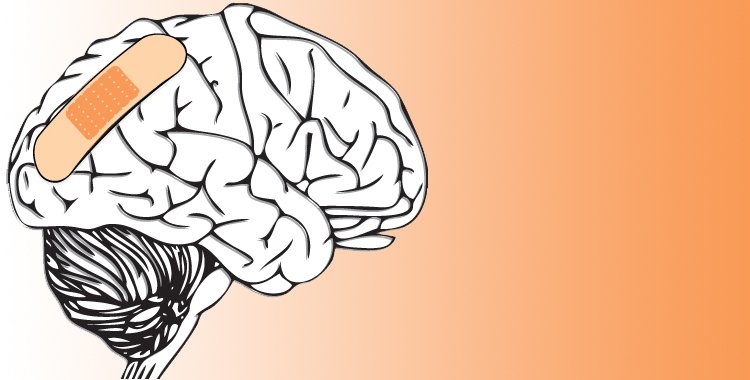
外傷性脳損傷 (TBI)とは、頭をぶつけたり、殴ったり、衝撃を受けたり、あるいは頭部を貫通するような衝撃を受けたりすることによって引き起こされる、正常な脳機能の障害のことである。 頭部外傷.
脳震盪 は軽度のTBIの一種である。
どちらも頭痛や錯乱などさまざまな症状を引き起こす可能性がある、 メモリー 問題点そしてめまい。
の効果を調べた研究がいくつかある。 シチコリン の人の場合 外傷性脳損傷と脳震盪.
ある総説の中で、研究者たちは次の可能性について論じている。 シチコリン TBIを含むさまざまな神経障害の治療においてである。彼らは次のように述べている。 シチコリン お役に立ちます 損傷した脳細胞を修復する 認知機能を改善する 脳損傷 (29).
ある研究では 頭部外傷 が与えられた。 シチコリン.この治療の結果 記憶力の向上 そして行動である。研究者たちは次のように結論づけた。 シチコリン の治療に役立つ。 脳震盪後症状 (30).
別の研究では シチコリン 認知機能と運動機能に関してである。
その結果、以下のことが明らかになった。 シチコリン 認知機能と運動機能の両方が改善された(28)。
と考えられている。 シチコリン の回復プロセスを助けることができる。 外傷性脳損傷 神経可塑性を促進することによってである、 e神経伝達物質の生産を促進する, 炎症を抑えるそして 脳組織の修復と再生.
13.シチコリンが耳鳴りの治療に役立つ
耳鳴りは、耳鳴りがしたり、ブーンという音がしたり、その他の雑音が聞こえたりすることを特徴とする症状です。
シチコリンが耳鳴りを緩和することを示唆する研究もある。
あるレトロスペクティブな症例検討で、研究者らは耳鳴りのためにシチコリンによる治療を受けた24人の患者の記録を調べた。
このレビューでは、少なくとも12週間シチコリンを服用した後、54%の患者が耳鳴りの軽減を経験していることがわかった(31)。
シチコリンが耳鳴りに効くのは、その神経保護作用と神経伝達物質調整作用によるものだろう。
14.シチコリンがパーキンソン病の治療に役立つ
パーキンソン病は進行性の神経疾患である。
脳内でドーパミンを産生するニューロンが死滅し、運動症状や認知症状を引き起こすのが特徴である。
研究によると、シチコリンがパーキンソン病患者に何らかの利益をもたらす可能性があることが示されている。認知機能を改善し、従来のパーキンソン病治療薬の効果を高める可能性がある。
総説では、パーキンソン病を含む様々な神経疾患の治療におけるシチコリンの潜在的な効果について論じている。
著者らは、シチコリンが神経細胞を損傷から守り、ドーパミンなどの神経伝達物質の産生を促進し、パーキンソン病患者の認知機能を改善する可能性を示唆している(32)。
ある研究では、パーキンソン病患者に対するシチコリンの効果が検討された。その結果、シチコリンは運動機能を改善し、症状の重篤度を軽減することがわかった(33)。
別の研究では、レボドパを投与されているパーキンソン病患者に対するシチコリンの効果が検討された。
その結果、シチコリンがパーキンソン病患者の認知機能に何らかのプラスの効果をもたらすことが示された(34)。
15.シチコリンが脳のミトコンドリア機能をサポートする
ミトコンドリアは細胞内のエネルギー産生小器官である。
その最適な機能は、細胞の健康とエネルギー代謝の維持に不可欠である。
脳のミトコンドリアをサポートすることで、脳全体の健康を維持し、神経変性疾患の発症を予防することができる。
シチコリンは、ミトコンドリア機能をサポートする方法のひとつである。
脳のエネルギー生産を向上させる効果がある。
研究によると、ATP(アデノシン三リン酸)の産生を増加させることで、脳のエネルギー代謝を高めるという。ATPは細胞の主要なエネルギー源である。
このようにエネルギー利用可能性が高まると、疲労が軽減され、認知能力が向上する。
ある研究では、研究者たちはシチコリンの神経保護効果を調べた。
その結果、シチコリンが脳のミトコンドリア機能を改善することが示された(35)。
シチコリンには、他にもさまざまなメカニズムで脳のミトコンドリア機能をサポートする可能性がある。これには、リン脂質合成のための前駆体分子の供給や、酸化ストレスの軽減などが含まれる。
16.シチコリンが反応時間を改善し、認知疲労を軽減する
反応時間は必要不可欠な認知機能である。意思決定、運転、スポーツのパフォーマンスなど、日常生活のさまざまな側面に影響を与える。
一方、認知疲労とは、精神的な努力を持続している間に、認知能力や精神的なエネルギーレベルが低下することである。
研究によると、シチコリンは反応時間を延ばし、認知エネルギーを高め、処理速度を向上させる。
ある研究では、運動速度、注意力、反応時間に対するシチコリンサプリメントの効果が調査された。
参加者はシチコリン(コグニジンとして)またはプラセボを28日間投与された。
その結果、シチコリン群では運動速度、注意力、反応時間に有意な改善がみられた(36)。
神経伝達物質の生産を増加させ、細胞膜の完全性を向上させることによって、これを達成する。
17.シチコリンが言葉の流暢さを改善する
言葉の流暢さは、言葉を素早く正確に生み出す能力を含む認知機能である。言語生産、コミュニケーション、実行機能に不可欠である。
ある研究では、記憶力の悪い高齢者にシチコリンを投与した。
参加者はシチコリンまたはプラセボを12週間投与された。
その結果、シチコリンが言語記憶能力を有意に向上させたことが示された(37)。
この研究では、結果としての言葉の流暢さは直接測定されていない。しかし、言語記憶の向上は、言語流暢性の向上と関連している。
田七人参乾燥エキス
田七人参 には多くの活性化学物質が含まれている。最も重要なものは、ジンセノサイドまたはパナクソサイドと呼ばれるものである。田七人参は、記憶力や思考力、アルツハイマー病、うつ病、その他多くの症状のために経口摂取される。
高麗人参は伝統的に神経系を保護するために用いられてきた。 高麗人参は記憶力の向上やアルツハイマー病などの脳の変性疾患の予防に効果がある。.高麗人参の神経保護作用は、うつ病の予防に役立つかもしれない。
高麗人参は適応性のあるハーブである。 身体をサポートし、ストレス、疲労、ブレインフォグに対する回復力を高める。.伝統的な中国医学では、記憶力のサポートや持久力の向上に広く用いられてきた。
高麗人参は、記憶力の低下を予防し、加齢に伴う記憶力の低下を軽減する潜在的な能力から、記憶力に最適なハーブのひとつである。漢方薬として最もポピュラーな植物のひとつである高麗人参には、ジンセノサイドと呼ばれる抗炎症作用のある化学物質が含まれている。
バコパ・モニエリ乾燥エキス
アーユルヴェーダにおけるバコパの主な適応症は以下の通りである。 記憶力改善、不眠症、てんかん、抗不安薬として.多くの臨床研究で、バコパを使用することで、言語学習、単語想起遅延、記憶習得、不安軽減の改善が実証されている。
バコパ・モニエリは、アーユルヴェーダでは何世紀にもわたり、記憶力の向上、不安感の軽減、てんかんの治療など、さまざまな目的で用いられてきた ( 2 ) 。実際、研究によると、バコパ・モニエリは脳機能を高め、不安やストレスを緩和する可能性がある。
バコパ・モニエリは、海馬のセロトニン濃度を高めることが発見されている。 また、セロトニントランスポーター(SERT)を増加させる。
イチョウ葉乾燥エキス
いくつかの研究は、イチョウがアルツハイマー病や血管性認知症の人々の記憶と思考にプラスの効果があることを示している。イチョウがアルツハイマー病の人々を助けるかもしれないことを示唆する研究: 思考、学習、記憶力の向上 (認知機能)
イチョウ製剤はADHDの行動および認知面に影響を及ぼす可能性がある。.主な行動学的効果は、心を落ち着かせ、フラストレーション耐性を向上させることである。イチョウ葉は意志的認知、弁別的注意を誘発し、イライラを減少させる。
イチョウの歴史は古く、血液疾患や記憶障害の治療に用いられてきた。現在では、記憶力を鋭敏に保つ方法としてよく知られている。実験室での研究では、イチョウは 血管を広げ、血液の粘着性を少なくすることにより、血液循環を改善する。.抗酸化物質でもある。
カネカ ユビキノールQH
ナッド+ユビキノール:
- 疲労と倦怠感、慢性疲労症候群
- 細胞のエネルギー産生に寄与する
- 反応時間を短縮する(より良い探索力)
- 精神的注意力を高める
- ピークパワー性能の向上
- トレーニング中のコーディネーションと中枢神経系機能の向上
- スポーツスキルの向上
- 無酸素運動と有酸素運動の閾値と能力の向上
- Rを防ぐハバドミオルシス
- 50%以上のATP-CPエネルギーシステムを改善
ユビキノールとは?
ユビキノールは、CoQ10(コエンザイムQ10)の活性型かつ非酸化型で、体内で容易に利用できます。
ユビキノールと通常のCoQ10の違いは何ですか?
ユビキノールはCoQ10の中で最も吸収されやすく、体内で最も強力な脂溶性抗酸化物質の一つです。また、ユビキノールは体内のCoQ10の主要な形態(95%以上)でもあります。
CoQ10は体内のあらゆる細胞に存在する必須栄養素で、細胞にエネルギーを供給し、臓器が最高のパフォーマンスを発揮するのを助け、細胞や血液を酸化から守るために不可欠です。
ユビキノールとCoQ10の違いは何ですか?
ユビキノールとユビキノンは、どちらもCoQ10の一種で、細胞のエネルギー産生に必要な物質です。
ユビキノン - 酸化型
ユビキノンはCoQ10の酸化型であり、サプリメントとして摂取され、30年以上にわたって研究されてきました。過去30年以上にわたって、CoQ10は一般的な健康やウェルネスだけでなく、心臓血管や神経系の健康にも役立つことが認められてきました。
ユビキノール - 活性型
細胞のエネルギーを生成するためには、ユビキノンをユビキノールに変換しなければならない。
この変換が行われないと、体内のエネルギー生産プロセスが完了せず、エネルギーレベルを維持することができない。このように、ユビキノールと還元型ユビキノールは、体本来のエネルギーを維持するために非常に重要です。ユビキノールの還元型がサプリメントとして利用できるようになったのは近年のことで、現在では国際的に入手可能です。
CoQ10とユビキノールの違い
ユビキノールとユビキノンは、どちらもCoQ10の一種で、細胞のエネルギー産生に必要な物質です。
ユビキノンはCoQ10の酸化型であり、50年以上にわたってサプリメントとして摂取され、研究されてきた。
過去50年にわたり、CoQ10は一般的な健康やウェルネスだけでなく、心臓血管や神経系の健康にも役立つことが認められてきた。
ユビキノールは、CoQ10の還元型(酸化型ではない)であり、細胞エネルギーの体内自然生産に不可欠で、細胞に強力な抗酸化保護を提供します。ユビキノールがなければ、体はエネルギーを維持できません。
近年、サプリメントの形で入手できるようになり、現在では国際的に販売されている。
速報
- 18の臨床研究が、従来のコエンザイムよりもユビキノールに優れた効果があることを強調している。
- ユビキノールは従来のコエンザイムQ10の3~8倍の吸収性があります。
- ユビキノールは、酸化ストレスやフリーラジカルによるダメージから身体の細胞を守る働きをします。
- ユビキノールはCoQ10に比べて吸収力に優れているため、同じ効果を得るために摂取量を減らすことができます。
エネルギーとパフォーマンス
疲れや倦怠感を感じていませんか?体内のユビキノールレベルが低下している可能性があります。ユビキノールは体内でエネルギーを生成するために必要です。ユビキノールは細胞内で働き、エネルギーレベルを自然に高めます。
ユビキノールは、ATPとして知られる、細胞内で代謝のための化学エネルギーを伝達する分子である、細胞のエネルギーを生成するための電子の移動に大きな役割を果たしています。
現在、医師や研究者は、ユビキノンが持っていないユビキノールの抗酸化機能を、体内の細胞システムと細胞エネルギー生産プロセスにおける最も重要な機能のひとつと考えています。
運動とエネルギー
テストステロンブースターはまた、トレーニングしたアスリートのパワー生産を高めることができる。 ユビキノールを摂取したアスリートは、わずか6週間で体重1kgあたりのパワーが2.5%以上増加した。
Journal of Sports Nutrition誌に発表されたこの研究では、ユビキノールの補給により、プラセボを摂取したアスリートと比較して、身体能力が有意に向上することが明らかになった。
疲労
どんなに休んでも、どんなに質の良い睡眠を取っても、疲労感が抜けないのはなぜだろうと考えたことはないだろうか。あまりにも疲れているとき、Betwizのようなゲームがリラックスを促してくれることがある。
その答えは、ユビキノールの枯渇にあるかもしれない。ユビキノールは、体内に自然に存在する抗酸化物質で、エネルギー産生をサポートする役割を担っている。
研究によると、加齢とともに天然のユビキノールレベルは低下し、体内でユビキノールレベルを回復させる能力も低下する。[1].
ユビキノールは、細胞のエネルギー産生を助ける「点火プラグ」です。
年齢を重ねたり、生活習慣や食生活、環境要因によって長期的なストレスを受けたりすると、天然のユビキノールレベルが枯渇し、ユビキノールを生成する能力が低下する可能性があります。そのため、ストレスに打ち勝つためにCBDオイルを使用する人もいます。
これに加えて、健康な人でも、通常の代謝によって体内で発生するフリーラジカル活性と酸化ストレスは、年を取るにつれて増加する。[2].
体内における抗酸化物質の主な役割のひとつは、フリーラジカルの活性や酸化ストレスに対抗することです。そのため、ユビキノールのような抗酸化物質は、正常に機能する細胞の機能低下を最小限に抑え、必要なレベルのユビキノールを体内に戻すことで、健康的な加齢をサポートします。
エネルギー産生が低下すると、心臓や肝臓などの臓器の自然なエネルギーレベルに影響を及ぼし、それらの臓器が最適に機能しなくなります。これが、体がだるく、全体的に疲れていると感じる原因かもしれません。
ユビキノールはどのように役立つのか?
1日に最低限必要な量(100~150mg)のユビキノールを摂取するためには、3.4kgの赤身肉、5.7kgの鶏肉、または50カップのほうれん草を食べる必要がある。
科学的研究により、ユビキノールを活性型かつ生物学的に利用しやすい形態にすることは、ユビキノールの健康的なレベルを回復し、最適なエネルギーレベルをサポートする効率的な方法である可能性が示されています。
参考文献
[1] Lambrechts, P & Siebrecht S 'Agro Food Industry Hi Tech', March/April 2013 vol. 24 (2)
[2] Hosoe K et al, ユビキノール(カネカQH)の安全性と生物学的利用能に関する研究TM)を健常人ボランティアに単回および4週間反復経口投与した。Regul Toxicol Pharmacol 2007; 47: 19-28
[3] 池松秀明ら、健常人におけるコエンザイムQ10(カネカQ10)の安全性評価:二重盲検無作為化プラセボ対照試験。Regul Toxicol Pharmacol 2006; 44: 212-218
[4] Shults CW et al, Pilot trial of high dosages of coenzyme Q10 in patients with Parkinson's disease.Exper Neurol 2004; 188:491- 494
[5] 久保秀之ら、日本人の食事におけるユビキノール10+ユビキノン10の食品含量、食品成分分析、2008、199-210
マリタイム・パイン乾燥エキス
海松(Pinus pinaster)は地中海沿岸の国々で育つ。その樹皮は、喘息や脚の血行改善に役立つ可能性がある。海松には以下のような化学物質が含まれている。 血流を改善し、免疫システムを刺激し、腫れを抑え、感染症を予防し、抗酸化作用がある。.
脳研究 - メリット
- アルツハイマー病のリスクを軽減する可能性がある。 脳内のβアミロイド斑から神経細胞を保護することによってである。
- プロモーション 健康な脳機能.2011年にイタリアで行われた試験では、学生に松樹皮抽出物のサプリメントを8週間投与したところ、集中力、記憶力、気分が向上し、不安レベルが低下した。これは脳への血流が改善された結果だと考えられている。以前の研究では、健康な高齢者の記憶力が向上し、酸化ストレスマーカーが減少した。
- 子どものADHD症状を軽減する.小規模の初期試験で、松樹皮抽出物が注意欠陥多動性障害(ADHD)の子供たちの酸化的損傷を軽減し、抗酸化物質レベルを高め、免疫力と神経化学的バランスを改善することが示された。また、関連する身体的・精神的不定愁訴の軽減も示された。研究者らは、不整脈、不眠症、食欲減退など、いくつかの深刻な副作用があるメチルフェニデート(リタリンなど)の代替薬として松樹皮エキスを評価した。PBEは、この予備試験において、重篤な副作用がなく、少なくともメチルフェニデートと同等の効果があり、プラセボよりも有効であることが示された。より大規模なフォローアップ試験が2017年に発表された。
一般的なメリット:
- 緩和 酸化ストレス フリーラジカルを消去する抗酸化酵素の生産を増加させることによって。
- 抗炎症剤として、 松樹皮抽出物は、血液中の循環炎症物質の量を減少させることができる。
- を改善する。 他の抗酸化物質の吸収特にビタミンCとE。
- その抗酸化作用は 肌本来のUVプロテクション そして、太陽による老化が徐々に進行する。
- プロモーション 創傷治癒 血行を改善し、炎症を鎮める。
- をサポートする。 免疫システム また、抗菌作用、抗炎症作用、抗酸化作用の組み合わせにより、感染症と闘い、自己免疫反応を防ぐのを助ける。
- 抗菌松樹皮抽出物は、ブドウ球菌、大腸菌、およびシュードモナス菌の感染を食い止めることが示されている。
- 可能 心臓病のリスクを減らす 有害なコレステロール(LDL)のレベルを下げ、善玉コレステロール(HDL)を増やすことによって。
- 5月 血圧低下 そして 血行不良を改善する。 松樹皮エキスは、体内で一酸化窒素を生成するのを助け、血行を改善し、血管を弛緩させて血圧を下げる。
- 以下をサポートする 静脈瘤2015年の研究では、松樹皮抽出物は血行を改善し、静脈瘤の腫れを軽減することが示された。
- 抗発がん性松樹皮抽出物は肺癌や皮膚癌の腫瘍細胞の成長を遅らせる可能性がある。
- を改善する。 肺の健康.松樹皮エキスは慢性肺疾患の治療に有効であることが示されている。
- 治療と予防 喪失 聴覚と平衡感覚 耳の感染症や毒性によるもの。
- 可能 グルコース値の低下 糖尿病患者の場合。
- 抗アレルギー自己免疫反応を鎮めることにより、アレルギーの症状を軽減する。
- 抗炎症作用 喘息
- 鎮痛薬として、以下の効果が認められている。 月経痛の軽減.
- 運動持久力を促進し、筋肉疲労を軽減する アスリートにおいては、酸化ストレスを軽減することで、炎症を抑えることができる。
- 以下はその一例である。 勃起不全ある日本の研究によれば、従来の薬のような副作用はない。
- の進行を遅らせることができる。 骨関節炎主に抗炎症作用により、関節痛を軽減する。
- 可能 目を守る 眼球への血流を増加させることにより、網膜微小出血を防ぐ。
- のリスクを軽減する可能性がある。 白内障松樹皮の抗酸化作用は、白内障を予防し、太陽の有害な影響から目を守るのに役立つ。
ベリテ™ピュアレスベラトロール
ベリテ レスベラトロールの再構築
レスベラトロール:健康な生活のための成分
レスベラトロールはポリフェノールの一種で、数種類の植物に含まれている。ブドウでは、レスベラトロールは過酷な環境から身を守る働きをする。科学的な証拠によると、レスベラトロールは人間の細胞レベルでも同じ働きをし、健康的な生活をサポートする。発表された研究や臨床データは、レスベラトロールが骨の健康、心臓血管の健康、血糖値のサポート、健康的な認知機能、肌の若々しさ、口腔の健康などを通じて、健康的な生活に一役買うことを示唆しています。エボルバは、ヒトの老化におけるレスベラトロールの重要な効能をさらに解明するため、臨床試験や研究調査の支援に尽力しています。
ミトコンドリアは、私たちの体内のすべての細胞内でエネルギーを作る発電所である。加齢とともに、ミトコンドリアの機能は徐々に低下していく。これは、心血管系、認知機能、皮膚、骨など、年をとるにつれて体内の多くのシステムの衰えにつながる。レスベラトロールは細胞に浸透し、ミトコンドリアを若返らせることで、より健康的な生活をサポートすることが示されています。この細胞レベルでの働きにより、レスベラトロールは身体の多くの部分に有益な効果をもたらすことができる。
レスベラトロールの働き
レスベラトロール(別名。 トランス-レスベラトロールまたは3,4′,5-トリヒドロキシスチルベン)は天然のフィトアレキシン化合物で、赤ブドウの皮、イタドリ、ピーナッツ、ブルーベリー、その他のベリー類に含まれている。1 自然界では、一部の植物がストレス、傷害、感染、紫外線(UV)照射に反応して生成する。2 ヒトでは、レスベラトロールは非常に効果的な抗酸化物質としてだけでなく、注目されている。3 また、細胞レベルおよび全身レベルで多くの補完的機能を発揮し、多くの有益な健康効果をもたらす。4 それ以来、このポリフェノールに対する科学的関心は飛躍的に高まっている。発見以来、現在までに12,000以上の科学論文が発表され、200以上のヒト臨床試験が行われている。6 今日、レスベラトロールは、特に心臓血管の健康に対する有益な作用が認められている。7血糖値サポート8骨の健康9,10メモリ11 そして肌の健康。12 そのためレスベラトロールは、健康的な生活をサポートする重要な成分として広く使われている。
ピロロキノリンキノン
- 糖尿病対策ミトコンドリアの問題は糖尿病の原因の一部である。...
- 炎症。PQQは、血液中のC反応性タンパク質、インターロイキン-6、および他のマーカーを低下させることにより、炎症を低下させる可能性があります。
- 向精神薬。
- 睡眠と気分
- テストステロン増加
- 神経保護特性
ピロロキノリンキノン二ナトリウム塩(PQQ)は、これまで 高齢者(45歳以上)の脳機能と認知機能を改善することが証明されている。
PQQは、明らかに生存に有益な生物学的機能の範囲に関与している(例えば、新生児成長、生殖能力、肝機能および筋機能、ミトコンドリア形成の最適化)、 また、神経保護、認知機能、免疫機能、抗酸化機能の改善にも役立つ。
一方、PQQ(20mg/kg)は血清グルコースを50%減少させた、 インスリンとテストステロンの濃度をそれぞれ59%と169%増加させた。 これらの結果は、PQQが糖尿病による精巣機能障害を改善する可能性があることを示唆している。
ビタミンB6とB12
特にビタミンB群 - B6とB12 - 。 健康な脳の発達と機能との関連が指摘されている.ビタミンB群の脳への効果として最もよく知られているのは、エネルギー生産における役割である。
B6とB12 気分から認知に至るまで、健全な脳の発達と機能との関連性
ビタミンB6 ホモシステインのレベルを下げることで、間接的に脳機能を助ける可能性がある。このタンパク質の体内濃度が高いほど、認知症、アルツハイマー病、認知機能低下の発症率が高くなる。
B12は神経系の健康に重要な栄養素である。.気分を高揚させる神経伝達物質であるセロトニンとドーパミンの生成に重要である。その結果、ビタミンB12はうつ病や不安症の予防と治療に役立つ。また、集中力や記憶力を高める効果もある。
ビタミンB6や葉酸を含む他のビタミンB群が少ないか不足している、 脳霧の症状を悪化させる可能性もある集中力や記憶力の低下
NADH
NADH 体内でエネルギーを作るのを助ける.
それが何か:
NADHは「ニコチンアミドアデニンジヌクレオチド(NAD)+水素(H)」の略。体内に自然に存在し、次のような役割を果たしている。 エネルギーを生み出す.体内で生成されたNADHは、体内のエネルギー作りに関与している。
ほとんどの人は、NADブースターとしてNMN(ニコチンアミド・モノヌクレオチド)を使う。NADHはNMNよりもはるかに強力である。
メリット
慢性疲労症候群(筋痛性脳脊髄炎またはME/CFSとしても知られる)の治療のためにサプリメントの形で摂取する人もいる。
また、NADHはエネルギーレベルを高め、精神の明瞭さ、注意力、集中力、記憶力を向上させる。
NADHは以下の用途に使われる。 精神の明瞭さ、注意力、集中力、記憶力の向上、アルツハイマー病の治療。.NADHはエネルギー産生に関与するため、運動持久力の向上や慢性疲労症候群(CFS)の治療にも用いられる。
NADHはテトラヒドロビオプテリンを合成する際の補酵素として機能する。 NADHの補充は、ドーパミン合成の平衡をより多くのテトラヒドロビオプテリンにシフトさせ、内因性ドーパミンの生産を増加させる可能性がある。.
NADHはミトコンドリアの生合成と機能を刺激し、また細胞代謝に関連するグローバルな遺伝子発現を制御することによってエネルギー代謝を高める。
NADは細胞レベルで直接吸収されるからだ、 慢性的な疲労に悩まされている場合でも、エネルギー生産を増加させる。.
NADH-若さとエネルギーの鍵分子
ニコチンアミドアデニンジヌクレオチド、または NADHナイアシンから作られる補酵素である。すべての生体細胞に存在する。体内で触媒のように働き、他の物質の化学変化を促すタンパク質である補酵素として、NADHは酵素が本来の働きをするのを助ける重要な役割を果たしている。ほとんどの補酵素はビタミンから合成され、最適なエネルギー生産のためには、体内で十分な量の補酵素が必要です。補酵素も例外ではないが、本当は NADHの役割?
人の中で、 NADHサプリメント NADHは、ATP(アデノシン三リン酸)の産生を促し、細胞に蓄えられたエネルギーの放出を制御する化合物である。NADHが多ければ多いほど、細胞はより多くの化学エネルギーを生産する。研究結果によると、脳内の濃度が高まると、健全な精神機能に不可欠な神経伝達物質脳内物質の生産が促進される可能性がある。
最近まで、NADHは胃酸によってデリケートな分子が急速に破壊されるため、静脈内投与しかできなかった。しかし、NADH錠剤を腸溶性コーティングして経口補給すると、細胞内レベルが上昇することが証明されている!
NADH補給の利点
経口サプリメントは以下のような目的で使用されてきた。 戦闘疲労 そして エネルギーを高める.NADHはまた、スペインのバル・デブロン病院での最近の臨床試験で、次のような目的で試験されている。 慢性疲労症候群の治療 そして線維筋痛症である。研究者たちはまた、アルツハイマー病患者の精神機能の改善や、パーキンソン病患者の身体障害の最小化、うつ病の緩和に対するNADHサプリメントの価値についても研究している。私自身は現在、ローハンプトン大学の臨床神経科学研究室で、NADHの神経幹細胞への作用を研究している。
しかし、NADHは病気にかかっている人だけのものではない。健康な人であれば、経口サプリメントから多くのものを得ることができる。それはなぜか?NADHには次のような効果がある:
- エネルギーを高め、疲労を軽減する。
- 優れた抗酸化力とフリーラジカル除去力で免疫系をサポート。
- 記憶力、集中力を高め、精神を明瞭にする。
- セロトニン、ドーパミン、ノルアドレナリンなどの神経伝達物質の生成をサポートする。
- 気分と感情のバランスを高める。
また、「若さを保つ」ことに興味のある方は、NADHがミトコンドリア内の「サーチュイン」と呼ばれる酵素群を活性化することをご存知だろう。
ミトコンドリアとは何なのか?
ミトコンドリアは、エネルギー(ATP)を生産する細胞の発電所である。ミトコンドリアは、身体の各細胞内にあるエンジンのようなもの、つまりエネルギー生産装置である。ミトコンドリアはATPの形で細胞にエネルギーを供給するが、まさにここでNADHが登場する。サーチュインは、NADHが酸化型補酵素Q10(ユビキノン)を還元型補酵素Q10(ユビキノール)に変化させる化学反応に関与している。NADH1分子がミトコンドリアに到達するごとに、ATPが3分子生成される。 つまり、NADHがエネルギー産生を可能にすることで、いかに体が機能するための重要な要素であるかがわかるだろう。NADHがなければ、ミトコンドリアはエネルギーを生産できず、細胞は死んでしまう。
サーチュインとは何なのか?
サーチュインはミトコンドリア内の様々な場所に存在する酵素である。仕事をするためには大量のNADHを必要とする。その仕事とは?サーチュインが正常に働いている場合、ミトコンドリア内で起こる酸化によって生じる酸化ストレスに対する抵抗力を促進する。酸化は燃焼に似ている。ミトコンドリアを、カロリーが燃焼されエネルギーに変換される「炉」と考えるなら、サーチュインは、私たちのすべての細胞のすべてのミトコンドリアで24時間365日絶え間なく起こっているこの燃焼によってミトコンドリア自体に引き起こされるダメージを最小限に抑える。
サーチュインはまた、炎症遺伝子や、老化の促進、細胞の老化、変性疾患に関連する遺伝子のスイッチを切ることができる。サーチュインがどのように老化を制御しているかについての研究は盛んである。すなわち、サーチュインは、炎症、脂肪の合成と蓄積、血糖値の管理など、老化を促進する特定の遺伝子を「オフ」にすることができる。 サーチュインはまた、カロリー制限や「絶食」と同様の効果をもたらす。つまり、サーチュインを活性化することで、炎症が抑えられ、脂肪の合成や蓄積、グルコース代謝が改善される可能性が高い。
では、食べ物からNADHを摂取することはできるのか?
魚、鶏肉、牛肉、イースト菌やイースト菌エキスを使った製品はすべてNADHを含んでいるが、非常に揮発性の分子であるため、体内に吸収されにくく、利用されにくい。そのため、NADHの体内への吸収や利用が難しいのである。 NADHの利点 をサプリメントとして摂取することである。
商品詳細
食品サプリメント
カプセル19.23g - 20カプセル
推奨される使用法
推奨使用方法:1日1~2カプセルを食事と一緒にお召し上がりください。
1日の推奨摂取量2カプセル
原材料 ライオンのたてがみ乾燥エキスエリシウム (雄)パース、果実)、リボケア®UMPリボヌクレオチド(ウリジン5'一リン酸二ナトリウム塩)、シチコリン、カプセル(ゼラチン、着色料(炭酸カルシウム))、高麗人参乾燥エキス(田七人参 C.A.Mey.、根)、バコパ乾燥エキス(バコパ (L.)Wettst、地上部)、イチョウ乾燥エキス(イチョウ葉 葉)、カネカユビキノール™[コエンザイムQ10(ユビキノール)、デキストリン、アラビアガム、L-アスコルビン酸、レシチン]、マリタイムパイン乾燥エキス(マツ属 ラム、樹皮)、ベリテ純粋レスベラトロール、固化防止剤(脂肪酸マグネシウム塩)、ピロロキノリンキノン二ナトリウム塩、固化防止剤(二酸化ケイ素)、ビタミンB6(ピリドキサール5'リン酸塩)、ビタミンB12(シアノコバラミン)、ニコチンアミドアデニンジヌクレオチド(NADHヌクレオチド)
注:有効成分が高濃度で、保存料を使用していないサプリメントは、粉末状から固形状に変化することがあります。これは、湿度に特に敏感な成分の自然な作用です。開封後20~30日を目安にお召し上がりください。乾燥した涼しい場所で、蓋をよく閉めて保管してください。チューブからスクープを取り出す際は、濡れた手や道具を使用しないでください。

*このウェブサイトは、あなたの教育と一般的な健康情報のみを目的としています。このウェブサイトに含まれる考え、意見および提案は、いかなる健康状態または問題についても、医師による医学的助言、診断または治療の代わりとして使用されるものではありません。本ウェブサイトの利用者は、自身の健康問題について本ウェブサイトで提供される情報に依存すべきではありません。ご自身の健康に関するご質問は、かかりつけの医師にお尋ねください。主治医に相談することなく、薬の服用開始や中止をしないでください。私たちは、利用者にそのようなことを推奨するものではありませんし、医療従事者の助言を求めなかったことによる結果について責任を負うものでもありません。

